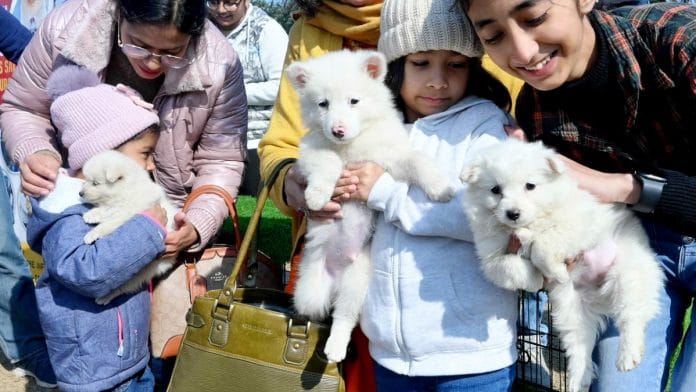Thank you dear subscribers, we are overwhelmed with your response.
Your Turn is a unique section from ThePrint featuring points of view from its subscribers. If you are a subscriber, have a point of view, please send it to us. If not, do subscribe here: https://theprint.in/subscribe/
A recent video clip of a monkey being given CPR by a policeman in Bulandshahr, is refreshingly heartwarming. In the world we inhabit, empathy and compassion are fast diminishing values. Human apathy towards other creatures who have an equal right to live on earth is leading to injustice and imbalance of the eco-system. Our ambitions of progress, development, self- preservation and leisure take a toll on its flora and fauna. Honey bees are now endangered, the once ubiquitous house sparrows have fallen prey to the modern edifices that don’t give them a foothold, kite flying during festivities maim unsuspecting birds. At the oft- receiving end of this insensitivity are our companions through the ages – our very own indigenous dogs. Referred to as “strays” or “street dogs” or euphemized as “community dogs”. Today, they look up to us humans for basic sustenance and we fail them miserably.
It’s annoying when resident WhatsApp groups of posh housing societies, upmarket localities, well maintained city neighborhoods including cantonment areas are fraught with complaints about these faithful creations of God. Some residents even going to the extent of saying that they mar the beauty and landscape of the chic surrounds. One can’t help but marvel at human vanity and arrogance – for we, in all shapes and sizes find ourselves profoundly complementing the beauty of a place!
A few lessons on equality and co-existence must be learnt from Mr Ratan Tata who insists that all animals that enter his properties be treated well. A fine example of this can be seen in a stray dog who happily resides near the entrance of the iconic Taj Mahal Hotel, Mumbai.
Humans feel entitled to have their way, the human way, not necessarily the most humane way. We take pride in making our pet dog “shake hands”, stand on two legs or are thrilled at the “caged” parrot speak a few of our words. We love to bring the expanse of the deep sea in our drawing rooms with its colourful fish limited to the boundaries of a transparent container. Some of us even dress our pets with ribbons, frills, hats or goggles. Human beings, bestowed with high intelligence are prone to alter the natural behaviour of other species to suit their needs.
The hostility and animosity towards community dogs perhaps stems from this. The stray dogs maintain a personality of their own and refuse to ‘conform’. They like to live in packs, a basic survival instinct, common to the animal kingdom. The perpetual contretemps between the dog lovers and the non -enthusiasts in housing clusters become tiring. Most residents are critical and deeply concerned about their ‘misdemeanor’ when they bark at a stranger or chase an unfamiliar vehicle; but choose to ignore mob mentality, xenophobia and many a life lost due to appalling human neglect, in other parts of the country or the world. The constant rant of ‘relocating’ the community dogs (not permissible) even when they are vaccinated, neutered or spayed; or detesting their being fed at designated feeding points is cruel and ungodly. The caregivers and feeders, who form the minority, are made to feel like habitual offenders.
One real concern is the dreaded, 100% fatal rabies, a zoonotic disease with no known cure. One can contract rabies if bitten by a rabid dog. According to experts, vaccinating 70% of dogs in a community would lead to herd immunity and prevent its spread. Some animal welfare NGOs are doing a commendable job of catching, vaccinating and releasing the animals back into their respective localities. Goa became the first state in India to achieve “rabies- free” status. Not a single case of human rabies was reported between Sep 2017 and Sep 2023. As per the data of the directorate of animal husbandry and veterinary services, rabies cases are on the rise in the adjoining talukas of Maharashtra and Karnataka and a few rabies positive cases among dogs have begun to surface. A human rabies positive case was also reported in the state after five years. Mission Rabies, the Goa model to eradicate the disease and its success shows that country -wide elimination of rabies in humans is indeed possible. India launched a new national action plan in 2021 to end rabies deaths by 2030 in sync with the WHO plan, 2018. However, honesty and sincerity of purpose in its implementation, with sympathy towards all, are imperative.
Our Indies or Pariah dogs are an important part of our bio-diversity and need to be preserved too. What they need is a little compassion and consideration, not cynicism and indifference. In a bid to allay our fears and misgivings, we can’t put them in harm’s way. Throwing the baby out with the bathwater is definitely not the solution.
Views are personal
These pieces are being published as they have been received – they have not been edited/fact-checked by ThePrint.



Well articulated material. Thoughts are live and heart touching with facts and reality mentioned in simple yet touching language. Loved reading it and felt touched. Look forward to more such article from Jayanti.